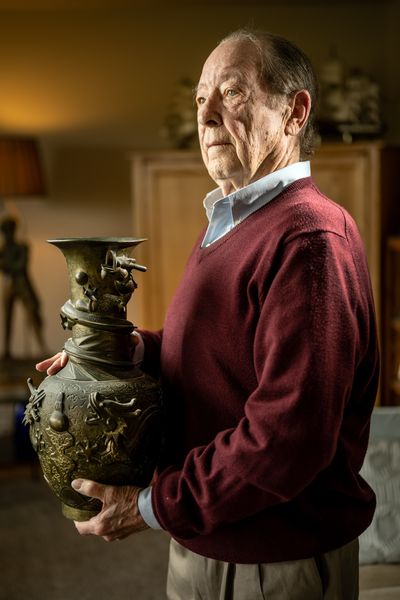Decades ago, a Spokane man briefly needed a place to stay in San Francisco. He wound up with a priceless Ming Dynasty vase

The story of how a presumed Ming Dynasty bronze vase from China ended up in the hands of a college student/cab driver in the late 1960s is worthy of a book or movie.
Art Conger graduated from Lewis and Clark High School in 1961. A few years later, he hit the road to the Haight-Ashbury district of San Francisco.
“It was the Summer of Love,” he said. “I was a young, restless person looking for something more.”
He met a girl, moved in with her, got a job driving a cab, and enrolled at San Francisco State University, where he eventually earned a degree in history.
When his girlfriend’s parents planned to visit, he needed to find a place to stay.
“People didn’t live together without being married back then,” he said. “So I looked for a place I could stay for a week or so.”
He saw a “Room for Let” sign at a small building and knocked on the door.
“A little, tiny old lady answered and agreed to let me have a room for a week,” Conger said.
The room was filthy, and he was concerned about the mental health of the elderly woman and her equally fragile sister, who also lived there.
The next day, he met the owner of the building, who told him the sisters were going to be taken into state care.
“He told me they were in their 90s and had lived in the building for 70 years,” Conger said.
The building owner told him he was going to offer the state $250 for all the stuff the women had to leave behind.
Conger promptly went downtown and offered $50 for the women’s worldly goods in exchange for cleaning the flats.
When the ladies were taken into care, he showed the owner his bill of sale. The landlord got a kick out of being duped by the upstart and agreed to let him clean up the building.
“It was horrible,” Conger said. “We found two rooms the owner didn’t even know about because they were buried beneath stuff.”
He rented a dumpster and got busy. When Conger stumbled upon the former tenants’ correspondences, the historian in him was intrigued. He discovered the sisters had come from the Midwest around the turn of the century and worked as prostitutes.
Many of the missives were from their favorite frequent visitor – a Merchant Marine who signed all of his letters, “Mr. McCormick.”
“There was no first name, and both of the ladies were in love with him,” Conger said.
One of the letters intrigued him. In it, McCormick wrote of being pressed into service by the United States during the Boxer Rebellion in China.
The anti-foreign, anti-colonial and anti-Christian uprising in China between 1899 and 1900 spurred an international force to quash it. Apparently, McCormick’s ship had docked in China and the crew was pressed into service by the allies.
McCormick wrote to the ladies when he was on his way back to San Francisco, describing the looting he’d been part of and the treasures he was bringing home.
“He wrote that he’d got some stuff out of the Forbidden City, from the temple where the Emperor worshipped,” Conger said. “He described a bronze vase in detail and I remembered seeing it in their flat.”
Unfortunately, Conger tossed the letters along with a lot of the sisters’ belongings, but he saved the 16-inch heavy bronze vase with the intertwining dragon motif, along with a pair of torch lamps, some rugs, jewelry and a few other mementos.
“I put the vase by my fireplace,” he said. “It was a great conversation piece.”
Despite his history degree, he ended up in the San Francisco Police Department, where he served almost 30 years.
During a divorce in 1990, he was looking for a car and responded to an ad posted by a local doctor, who happened to collect Chinese antiquities. When the physician saw the vase by Conger’s fireplace, he offered to swap the car in exchange for the vase. That’s when Conger realized he needed to know more about his bronze “conversation piece.”
“I took it to the Asian Art Museum of San Francisco to be authenticated,” he said. “They told me it was Ming Dynasty and was made between 1426 to 1435. They said the vases usually came in pairs.”
The museum staff showed him the markings on the bottom of the piece and explained the significance of the five-clawed dragon on his vase. It was the emperor’s sacred symbol of imperial power.
Conger thought to have the piece repatriated, and called the Chinese embassy in San Francisco.
“A young man insisted I bring the vase in immediately,” Conger said. “He was very rude.”
Conger kept the vase and brought it with him when he retired from the police force and returned to Spokane 15 years ago.
When reading up on the Conger genealogy, he discovered an amazing coincidence. The United States minister to China during the Boxer Rebellion was Edwin Hurd Conger – a distant cousin.
Recently, Conger hefted the bronze vase and ran his hands over the fierce five-clawed dragon that encircles it.
“It’s going to be up to my kids what they do with it when I’m gone,” he said. “But I hope someday they will return it to its home.”